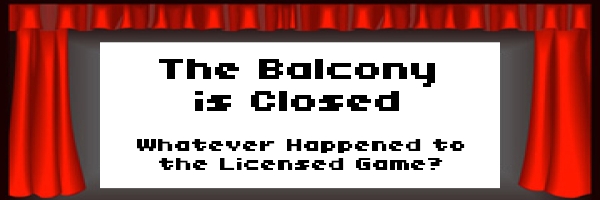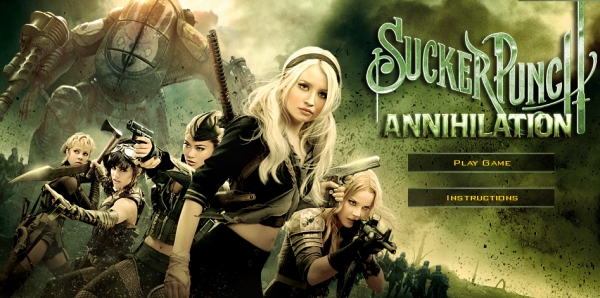
Licensed Games on Life Support
Today, it seems like publishers only want to take chances on licensed content if its based off of a children’s property or a big budget comic book movie. Just look at Sega and the aforementioned Thor movie. They teamed up with Liquid Entertainment and released Thor: God of Thunder earlier this week. The publisher will also bring this Summer’s other Marvel movie, Captain America, to game systems in Captain America: Super Soldier. Activision also enjoys playing in Marvel’s sandbox with Spider-Man: Edge of Time and an X-Men: First Class game in the works.
But this is a far cry from years past as movies that seem tailor-made for the movie-to-game treatment, like last Summer’s The Expendables, don’t receive a tie-in game. Although, in a way, they do. Movie games have just grown smaller in recent memory. For example, Sly and company went the Facebook Application route and licensed a Flash game that was heavily influenced by 80s favorite Contra. Matching a movie starring a bunch of 80s action heavyweights with the ultimate shooting series from the NES era was a stroke of genius, but hiding it on Facebook meant that almost no one played it, even though it was extremely well done.
Other movie games are shrinking down even further with an iPhone/iPad adaptation like last Summer’s Predators or the soon-to-be-released “adorable” Evil Dead app. The 8-bit aesthetic that these games are going for is far more in line with what gamemakers had to work with in the late 80s and 90s and their budget is likely more appropriate for a game that may only sell to die-hard fans of the series.
Sadly, this year’s action movie slate doesn’t seem to fare any better as perfect video game premises like Hugh Jackman’s Real Steel (basically Rock ‘Em, Sock ‘Em Robots: The Movie) or Sucker Punch (teen girls versus samurais, orcs, Nazis, Terminators and a fire-breathing dragon) failed to attract interest in the game industry. Although Warner Bros. did create Sucker Punch: Annilihation, another excellent Flash game that would have been a perfect fit on the XBLA or PSN.

One recent movie that has a video game to call its own was Battle: Los Angeles, and sure enough, it was released through the PSN, XBLA and Steam. But Konami was so embarassed by the mediocrity of the final product that they announced its existence only a week before it was dumped on the Xbox Live Arcade… on a Friday.
Movie Makers Make Games
While publishers like EA and THQ are moving away from creating tie-in games, movie makers like Disney and Warner Bros. are branching out into game development. Disney actually had a big-budget tie-in planned for the next Pirates of the Caribean film (Armada of the Damned) that was canceled in favor of Lego Pirates of the Caribean. This move is rather understandable as the Lego are surely cheaper to develop than a massive action RPG and it’ll likely sell better as well.
Warner Bros. (and their WB Games publishing label) has also mostly stayed away from licensed games with a few exceptions, producing a Terminator Salvation game in 2009. The publisher does have a few in development, though, including Batman: Arkham City, Green Lantern: Rise of the Manhunters, a new Lord of the Rings game (War in the North) and a Kinect-based “Sesame Street” game (developed by Tim Schafer, no less!). But as I said, all are based on comic book franchises or children’s properties.
Even directors have gotten into the game. Steven Spielberg is one of the most famous gamers in Hollywood (he founded the EA team now known as Danger Close and designed the Boom Blox series). Microsoft’s pact with Peter Jackson eventually fizzled, but his Halo: Chronicles kept gamers enamored for years even though not a single scrap of information was ever officially announced beyond his involvement. Guillermo Del Toro is working with THQ to “direct” Insane for the PS3 and Xbox 360. Christopher Nolan has said he wants to continue the story from Inception in a video game. Even Jerry Bruckheimer is hard at work on several unannounced games at his development studio, Jerry Bruckheimer Games.
Is the Balcony Closed?
Like Travis Bickle at the end of Taxi Driver (which was, believe it or not, in development as a game for awhile), the licensed game is in rough shape. Perhaps this is a sign of the growing maturation of the games industry. Maybe with the expanding scope of modern games like L.A. Noire and Uncharted 3 we don’t need to rely on licensed content to help tell a cinematic story.
But the lure of playing as our favorite characters will always be there, and so will the licensed game. Gamers want to sling webs with Spider-Man, blast Decepticons with Optimus Prime and slay Deadites with Ash. Hopefully, Hollywood and game publishers can reach some kind of agreement so that the creation of these titles isn’t such a financial strain on the final product. And hopefully game developers have learned that a game needs more than just a familar face to be enjoyable.
And maybe, just maybe, a game publisher will one day announce that “James Bond Will Return.”







